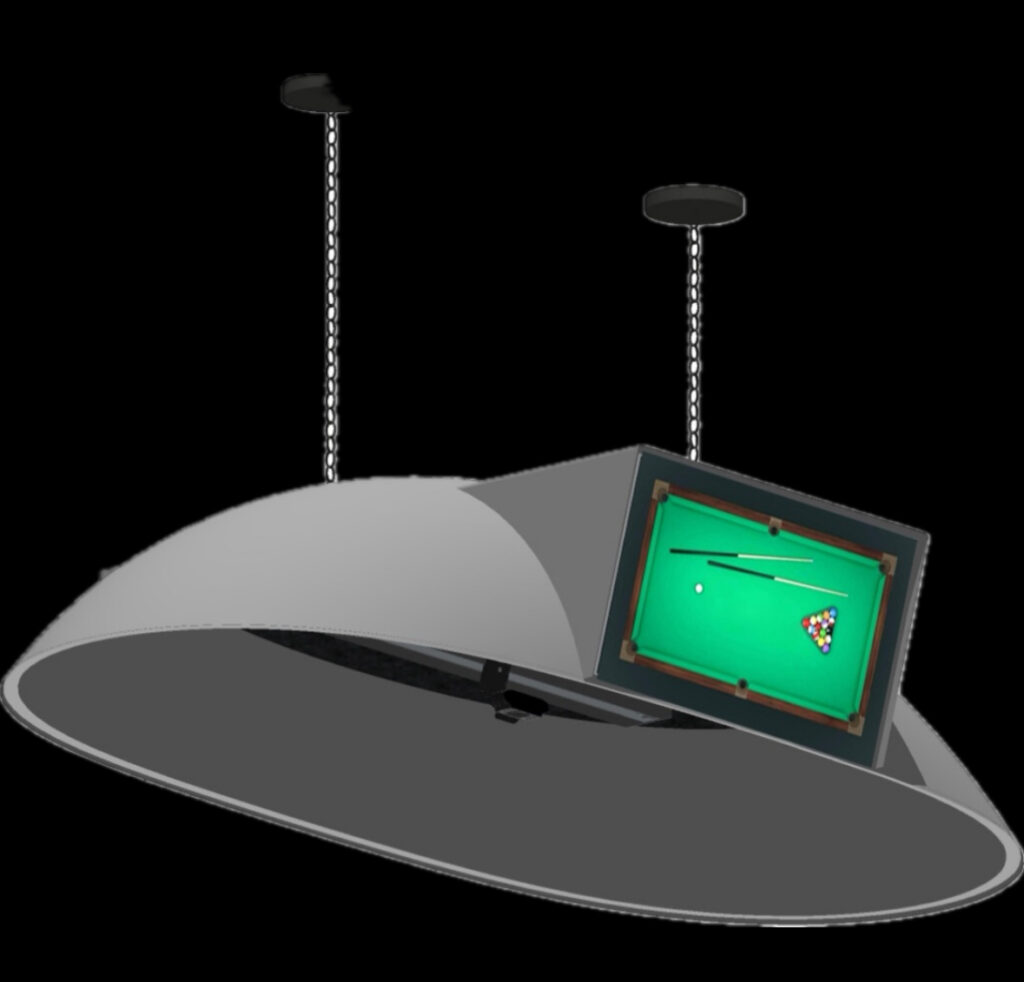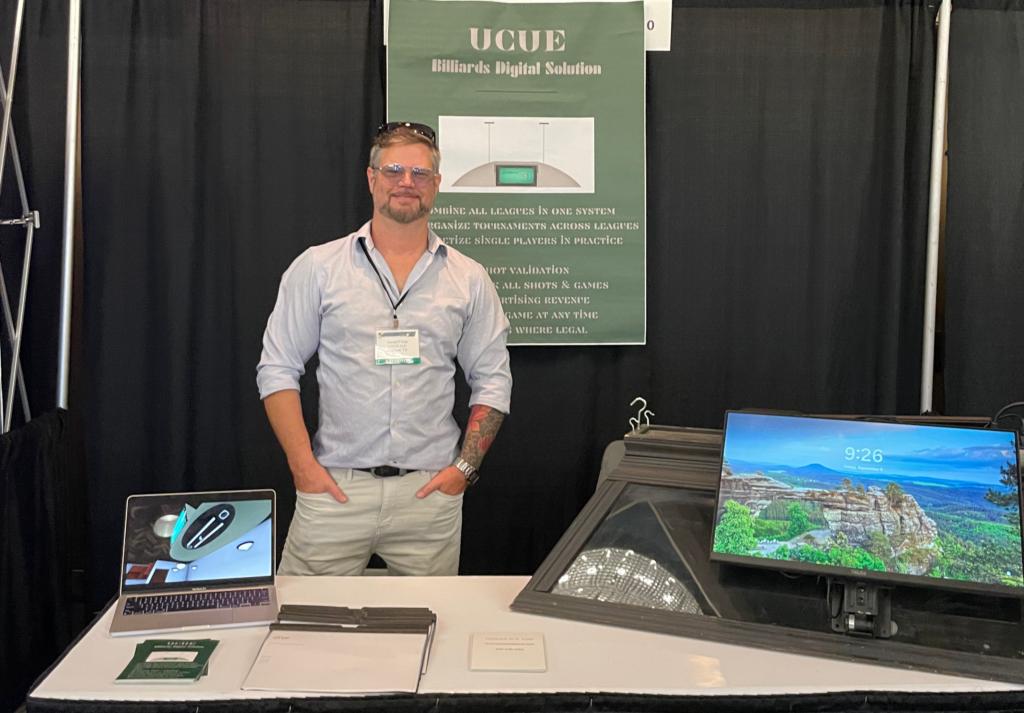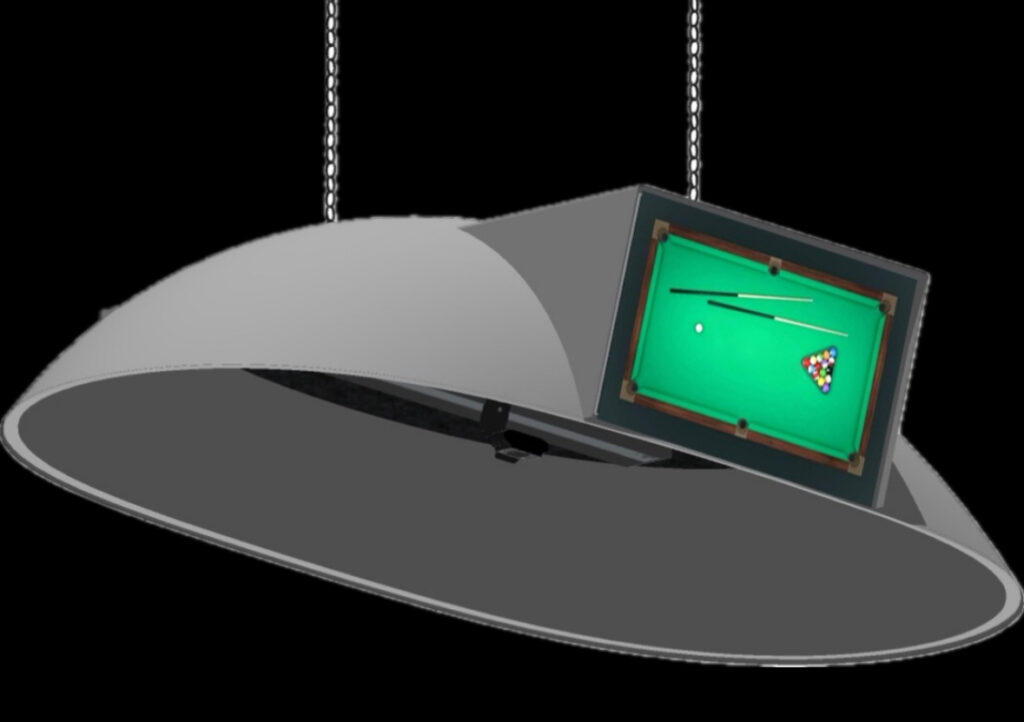Putting a High-Tech Spin on Pool
Former Operator Wants to Boost Player Numbers & Revenue with Gamified System
Billiards, aka “pool,” has been around for hundreds of years, but it will take a giant leap forward if former Texas operator Gerald “G.P.” Cole has his way. As president of UCUE LLC, he’s developing UCUE, a digital billiards solution. It’s a playfield viewing system and gamification platform with skill instruction, player connectivity, competition and more for on-location pool.

It’s his hope that this technological twist to the classic sport will also bring excitement, drawing new and younger players, reversing a downward trend he contends is caused by an aging pool-playing demographic. Citing statistics from Statista, Cole says the U.S. pool and billiard hall business dropped from $1.22 billion in 2012 to around $788 million in 2019. (Post-Covid numbers from Statista for 2022 show a market size of $669 million.)
For G.P. Cole, his UCUE’s technology is the answer.
The product is a pool table light on steroids. A molded housing holds fixed monitors above the table to display the game action as it’s played live. It suggests shots, helping build the skills of experienced and novice players alike, and offers live streaming through an internet/cloud-based app and links to social media.
Further, players create their own accounts which track wins and losses through a ranking system. UCUE’s ball identification and trajectory software not only displays shot lines on the table using lasers, but it can also rank the difficulty of those shots, giving a new level of tiered skill accreditation for live billiards play, Cole explains.
For coin-op pool operators and billiard halls, the goal is increased table play. They also will share in a percentage of all one-time pay-for-play, subscription signups and retention awards.
Cole and his programming team will add features to UCUE through three phases of development. “Players and viewers will ultimately be able to wager on billiard shots, games and standings, giving a global reach to income and competitiveness never imagined in such a device,” he said of the third phase, specifying that wagering will only be available where legal.
The Spark
G.P. got into the industry as a teen. His father, Jerry, worked at the American Distributing Co. (bought by Joe Miller of S&M Amusements) run by Joe and Leonard Matassa. Young G.P. signed on in the 1980s, working in the warehouse and wherever else they needed him. In his early 20s, he started doing outside service for the route, too. In the late 1990s, Joe passed away and when some family issues came up within American, Jerry and G.P. Cole set off to start their own operation.
Originally named “Belzies” after Jerry’s beloved pup, the father-son team changed it to Cole Vending and quickly grew. “We were grabbing spots left and right,” said G.P.
“Around 2010, I was playing online pool. It was brand new then; iPhones were out but apps weren’t that prevalent. Playing pool online, as you’d move your cue around, the program would give you the tangents for the different shots. I thought, ‘Why can’t this happen in real life?’ But back then, programmers wanted something like $500,000 and two years’ time to do the development. No one could really run the ball with that.”
But G.P. wouldn’t give up on the idea and in 2015, he built his first prototype. “I hooked up some laptops to cameras and put things together to see if it would work. It did, but the programming just wasn’t there. To keep things in perspective, YouTube wasn’t even capable of livestreaming at this time. It didn’t take much longer, though.
“I took the panels off an old Shiner pool table light, added black panels and touchscreens, and just uploaded games onto YouTube. Still, the programming wasn’t readily available. I started talking with programmers about it, but Covid hit, and everything shut down, including our route.
After Covid was over, there was forced attrition on the route as some of the pandemic-shuttered spots never reopened. His father started having heart trouble in November 2022 and by February the next year, he had passed away.
“Honestly, we’d been struggling to keep the route going ever since Covid was ‘over,’” G.P. said, “but when Dad passed, I sold it to Russell Jones of Trinity Amusements. I decided it was time to go fully with UCUE. It’s now on the cusp of being ready.”

The Nitty Gritty
Cole has a well-thought-out, three-phase development plan for UCUE with key achievements to hit with each. Of course, as development unfolds, so do new ideas and rethinking original concepts.
Rolling out now is Phase 1, which includes account creation (set up by a phone number or email address linked to a credit or debit card). Pricing is still under consideration, but as an example, there would be a $1 charge to record a game and make it available for viewing through a web-based system; highlighting individual “shots” would be an additional 50 cents. Membership plans will offer unlimited viewing and shot highlights at an estimated $20/month.
UCUE starts off with manual entry and players can use a slider to go back and review key moments in the game, a key skill-enhancement feature of the system. Points accumulate based on wins, runs (like three balls in a row), etc., and players can redeem these for t-shirts, chalk holders, gloves, hats and other pool-related prizes. The system can also associate you by league if you’re a member of VNEA, APA, etc. Other add-on purchases will be available, too, and players can freely share their best shots to YouTube, Instagram and other social platforms if they like.
“Phase 1 is to introduce people to UCUE and let them get used to using it,” he said, emphasizing that the pool table itself is unchanged and can be played the regular old way at any time without using the system.
Phase 2 is where the object ID and trajectory software come into play. Using computer vision learning, UCUE will recognize the cue ball, the stripes and solids, and where they are on the table, assessing shot difficulty. Players manually enter if they are playing 8-ball, 9-ball or some other game and also their league affiliation (if any) so those rules can be put into place for that game. It will track wins and losses so each player will have an automated accreditation.
“The cool thing,” Cole said, “is that the software will know if you’re sandbagging, noticing that you’ve played horribly for a few games in a row, and then run the table making incredible shots.”
Phase 2 is also when projections or lasers come into play on the table, looking at the shot lines, ball spin and speed. “That will probably be easier with projection than lasers, but we’re still working out the details of Phase 2’s programming,” he explained.
He’s excited about the before-you-shoot features. “The screen will show your shot options along with the percentage of difficulty. The player’s metadata will let the system know your capabilities and then it can tell you things like ‘You make this shot 80% of the time’ or ‘You have a 12% probability of making the shot.’ The lower the probability, the more points will be awarded if you make it.
“One of the coolest things, is the practice mode. On a drop pocket table, it will put a target on the table so you can practice speed, kickouts, etc., and gamify that, too,” he said. While tournaments are possible in Phase 1, they’re limited; Phase 2 will have a larger, more organized tournament structure that can track and award cash prizes just like regular pool tournaments. “You and your friend can even set up a tournament,” Cole said.
“By the end of Phase 2, VR and AR capability will arrive,” he added. “It’s insane how fast this is getting developed. When I started this idea, programmers asked me, ‘Do you know how much time this is going to take and how hard it’s going to be?’ But now, much of the technology is readily available.”
Augmented reality, he says, will make it possible to overlay games like croquet on the table while you shoot pool, racking up points along with the fun of cool animations, he said. For example, you score extra points when your ball passes through a virtual croquet hoop on its way to the target ball. Bowling pins could be overlaid with points scored if you knock one over while sinking a ball. “There can be spinning coins to hit, leprechauns, unicorns, you name it. You get points and cool animations through this ‘game within a game’ idea. This is the thing that people get most excited about when it comes to what UCUE can do,” he said. And, it’s this excitement that he hopes will bring more players to the game of billiards.
By Phase 3, Cole explained, the system will have a group or league of players, and have their information. Anyone sitting at home or anywhere can log in and watch any of the other players live. The system will show the probability of making that next shot – say 25% – and ask if they’d like to put a wager on it. Players can wager shot-by-shot within games, game by game, run by run, tournament by tournament, by player groups, teams and so on. There are vast options.”
“Right now, in Phase 1, everything is web-based. The billiard light with the screens on each side, a computer, camera, power supply are all within the unit. The computer connects to a cloud server that stores the information. During Phase 2, the system will know where you are by which UCUE device you’re logged into. You can invite players to join you by phone or email, too. None of the on-location computers store any data. They send it off to the server and reset in between each game.
“With Phase 3, the wagering component comes into play but it will only be available where legal. And ensuring this is as easy as geofencing,” he stressed, noting the similarity between that and the way TouchTunes and AMI knows if the jukebox serial number matches a distinct location. “If it doesn’t, it’s taken offline.”
Throughout all three phases, UCUE will offer advertising opportunities to increase revenue. Additionally, an app is in development which will mirror the web interface.
Cole said he continues to refine the ideas that come organically through conversations with people about UCUE. “There’s a lot of ‘What about this?’ and ‘What about that?’ The pool and billiard hall industry lost over $500 million between 2010 and 2020 just because of the aging of players. How do you make a 500-year-old game appealing? It’s through technology. Something digital needs to come along but nothing was. I had something in my head and now I’m making it real. It’s right there, right on the cusp.”
When Cole spoke with RePlay, he was busy thermoforming the light structures and tooling up to get units out on test in the Dallas area with fully functional, web-based Phase 1 units available by mid-month. “I’m actively looking for investors so this can get going on a broader scale. I can build them out one-by-one, but if I can get someone to invest fully, I could have UCUE from Maine to California by the end of the year.” To get in touch, email G.P. Cole at GPC@UCUEbilliard .com. He’s also on LinkedIn.


